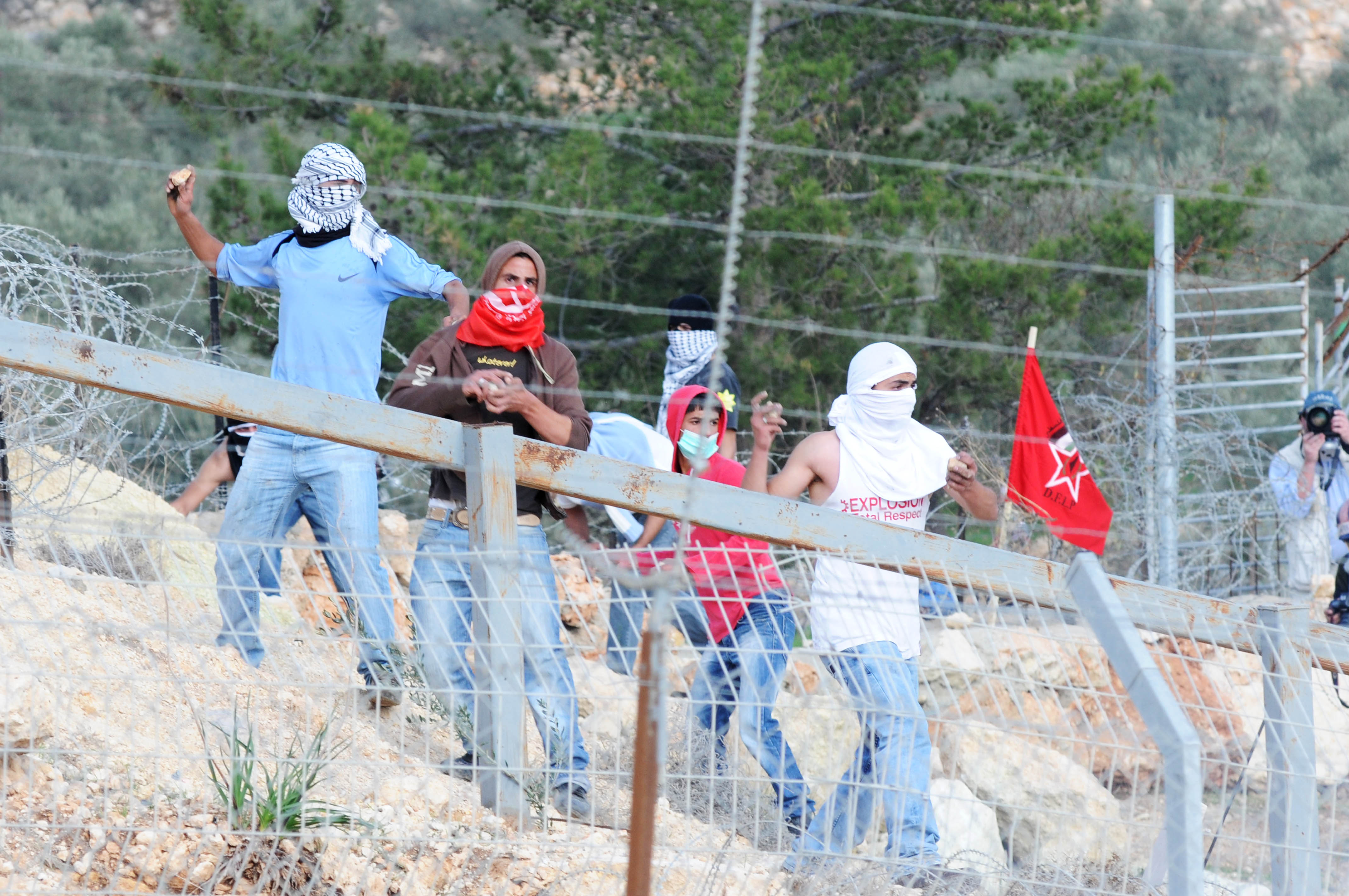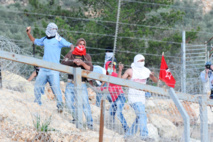The situation around the Temple Mount, as has repeatedly happened in the past, served as the reason for the conflict. Palestinians call it Al-Haram Al-Quds Al-Sharif - "the noble sanctuary" with one of the major Muslim shrines - the Al-Aqsa Mosque.
Despite more than a loyal attitude of Israel to the Muslim holy places (for example, it is forbidden to demonstrate symbols of the Jewish state and any non-Muslim prayer on the Temple Mount, and each violation is stopped quickly and effectively), the deep mutual mistrust between Israelis and Palestinians leads to the fact that any Jewish stir towards Al-Aqsa is perceived with the deepest suspicion by Palestinian community. There is not much of help even from constant assurances of Prime Minister Benjamin Netanyahu on that the status quo of the holy places would not be violated.
The story of the ancient Mughrabi bridge is quite illustratory: when it partially collapsed from disrepair, the Palestinians immediately accused the Israelis in supposedly wanting to cause harm to the Al-Aqsa Mosque. When a few years later the Israelites conceived to build a new bridge, the vigilant guardians of the Temple Mount have noticed spied out another Jewish conspiracy.
The spiral of violence started to spin at the beginning of September, when Israeli Defense Minister Moshe Ya'alon signed a decree, outlawed the activities of the organizations of the Arab patrols "Murabitun" and "Murabitat" on the Temple Mount. The ban was supposed to stop voluntary Palestinian combatants, tracking Israelis visiting the mountain and often picking fights with them. The Palestinians responded with "stone war", throwing cobblestones at cars with Israeli numbers.
The second half of the month became crucial. In 2015, the Jewish holiday of Rosh Hashanah and the Muslim Eid al-Adha superimposed on each other; as a result, the situation in Jerusalem grew tense, altercation occurred almost daily. Shortly before the holidays, Palestinian leader Mahmoud Abbas warned that the Muslim youth is warmed up and may start a new Intifada, though the Palestinian leadership does not want it. Apparently, he meant it: more and more of young Palestinians are evincing dissatisfaction with leaders who failed to make tangible progress towards the establishment of an independent state, and these young people are ready to act against the will of the authorities.
A few hours before the start of Rosh Hashanah, the Israeli police discovered stocks of homemade bombs, Molotov cocktails and stones, made by Palestinian activists. Extra police were put in the Old Town and the Israeli government passed a law toughening punishment for throwing stones and allowed to open fire at even minor stone-throwers.
Gradually, the riots on the Temple Mount went into decline. Yet, the heat of political debate remained high: in the Knesset, Arab MKs violently protested against the actions of the Israeli police, and Binyamin Netanyahu and Mahmoud Abbas have accused each other of escalating violence from the rostrum of the UN General Assembly.
The conflict, that seemingly extinct, flared up again at the beginning of this month. On the night of October 1, militants from the "Al-Aqsa Martyrs' Brigades" have killed Israelis - Eitam and Naama Henkin, religious Zionists, who emigrated from the US to Israel retaining US citizenship, and lived in the Jewish settlement of Neria, located in the West Bank. They were returning home when their car was ambushed. Their four children, aged from four months to nine years old, were injured and taken to hospital.
After the death of the Henkin spouses, Transport Minister Yisrael Katz said "Palestinians will pay a high price," he promised to establish a curfew and demolish houses of the terrorists relatives. President Reuven Rivlin assured that the extremists will be found and punished. However, two days later, a radical Palestinian stabbed two Israelis - 22-year-old Aaron Bennett and 41-year-old Rabbi Nehemiah Lavi - in the Old Town. The West Bank began to receive reports on clashes between the residents of Jewish settlements and Arabs from neighboring villages.
Israeli security forces went to the unprecedented step of restricting access for the Arabs in the Old City of Jerusalem and only men over 50 and women were allowed to pray on the Temple Mount. The unrest in Jerusalem was extinguished, yet the Palestinian territories continued disorders. The cost was the lives of three Palestinian teenagers threwing stones at Israeli soldiers.
After the bloodshed, opposition leader Yitzhak Herzog said that Israel is on the verge of the third Intifada. It is unclear whether his predictions will come true. The current wave of violence - not the first in recent years, but in previous cases, the excitement died down after a few weeks. Not least, it was because of the fact that neither the Israeli nor the Palestinian leadership did not want conflict and the security of both sides coordinated actions to prevent the proliferation of violence.
Now, however, relations between Abbas and Netanyahu are far from ideal, what the fierce swordplay from the rostrum of the General Assembly showed. In addition, the Israeli prime minister is being under pressure from right coalition allies and the representatives of the settlers, who are unhappy with his excessive mildness in relation to the Palestinians. So Abbas, willy-nilly, has to show firmness in the face of competition with Palestinian radicals. The coming weeks will show whether there is enough of the Palestinian and Israeli leadership’s patience and sanity.
original by Alexey Kuprianov, lenta.ru
Despite more than a loyal attitude of Israel to the Muslim holy places (for example, it is forbidden to demonstrate symbols of the Jewish state and any non-Muslim prayer on the Temple Mount, and each violation is stopped quickly and effectively), the deep mutual mistrust between Israelis and Palestinians leads to the fact that any Jewish stir towards Al-Aqsa is perceived with the deepest suspicion by Palestinian community. There is not much of help even from constant assurances of Prime Minister Benjamin Netanyahu on that the status quo of the holy places would not be violated.
The story of the ancient Mughrabi bridge is quite illustratory: when it partially collapsed from disrepair, the Palestinians immediately accused the Israelis in supposedly wanting to cause harm to the Al-Aqsa Mosque. When a few years later the Israelites conceived to build a new bridge, the vigilant guardians of the Temple Mount have noticed spied out another Jewish conspiracy.
The spiral of violence started to spin at the beginning of September, when Israeli Defense Minister Moshe Ya'alon signed a decree, outlawed the activities of the organizations of the Arab patrols "Murabitun" and "Murabitat" on the Temple Mount. The ban was supposed to stop voluntary Palestinian combatants, tracking Israelis visiting the mountain and often picking fights with them. The Palestinians responded with "stone war", throwing cobblestones at cars with Israeli numbers.
The second half of the month became crucial. In 2015, the Jewish holiday of Rosh Hashanah and the Muslim Eid al-Adha superimposed on each other; as a result, the situation in Jerusalem grew tense, altercation occurred almost daily. Shortly before the holidays, Palestinian leader Mahmoud Abbas warned that the Muslim youth is warmed up and may start a new Intifada, though the Palestinian leadership does not want it. Apparently, he meant it: more and more of young Palestinians are evincing dissatisfaction with leaders who failed to make tangible progress towards the establishment of an independent state, and these young people are ready to act against the will of the authorities.
A few hours before the start of Rosh Hashanah, the Israeli police discovered stocks of homemade bombs, Molotov cocktails and stones, made by Palestinian activists. Extra police were put in the Old Town and the Israeli government passed a law toughening punishment for throwing stones and allowed to open fire at even minor stone-throwers.
Gradually, the riots on the Temple Mount went into decline. Yet, the heat of political debate remained high: in the Knesset, Arab MKs violently protested against the actions of the Israeli police, and Binyamin Netanyahu and Mahmoud Abbas have accused each other of escalating violence from the rostrum of the UN General Assembly.
The conflict, that seemingly extinct, flared up again at the beginning of this month. On the night of October 1, militants from the "Al-Aqsa Martyrs' Brigades" have killed Israelis - Eitam and Naama Henkin, religious Zionists, who emigrated from the US to Israel retaining US citizenship, and lived in the Jewish settlement of Neria, located in the West Bank. They were returning home when their car was ambushed. Their four children, aged from four months to nine years old, were injured and taken to hospital.
After the death of the Henkin spouses, Transport Minister Yisrael Katz said "Palestinians will pay a high price," he promised to establish a curfew and demolish houses of the terrorists relatives. President Reuven Rivlin assured that the extremists will be found and punished. However, two days later, a radical Palestinian stabbed two Israelis - 22-year-old Aaron Bennett and 41-year-old Rabbi Nehemiah Lavi - in the Old Town. The West Bank began to receive reports on clashes between the residents of Jewish settlements and Arabs from neighboring villages.
Israeli security forces went to the unprecedented step of restricting access for the Arabs in the Old City of Jerusalem and only men over 50 and women were allowed to pray on the Temple Mount. The unrest in Jerusalem was extinguished, yet the Palestinian territories continued disorders. The cost was the lives of three Palestinian teenagers threwing stones at Israeli soldiers.
After the bloodshed, opposition leader Yitzhak Herzog said that Israel is on the verge of the third Intifada. It is unclear whether his predictions will come true. The current wave of violence - not the first in recent years, but in previous cases, the excitement died down after a few weeks. Not least, it was because of the fact that neither the Israeli nor the Palestinian leadership did not want conflict and the security of both sides coordinated actions to prevent the proliferation of violence.
Now, however, relations between Abbas and Netanyahu are far from ideal, what the fierce swordplay from the rostrum of the General Assembly showed. In addition, the Israeli prime minister is being under pressure from right coalition allies and the representatives of the settlers, who are unhappy with his excessive mildness in relation to the Palestinians. So Abbas, willy-nilly, has to show firmness in the face of competition with Palestinian radicals. The coming weeks will show whether there is enough of the Palestinian and Israeli leadership’s patience and sanity.
original by Alexey Kuprianov, lenta.ru



















